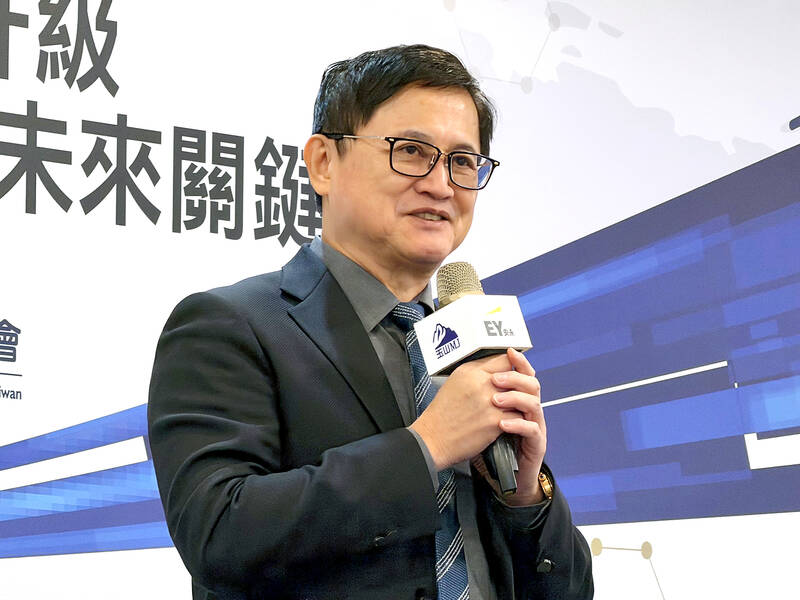Taiwan Semiconductor Manufacturing Co (TSMC, 台積電) is unlikely to be impacted if some of its technical secrets get leaked, Pegatron Corp (和碩) chairman Tung Tzu-hsien (童子賢) said yesterday.
Tung made the comment after local media reported that former TSMC executive vice president Lo Wei-jen (羅唯仁) allegedly took confidential data of the company’s most advanced 2 nanometer, A16 and A14 manufacturing process technologies before retiring from TSMC in July and was said to have joined Intel last month.
When asked by reporters about the case before attending a technology forum in Taipei, Tung said Taiwan’s semiconductor sector remains "globally competitive" and would not be seriously affected by "one or two individual incidents."

Photo: CNA
He said that TSMC’s advantage stems from a manufacturing system that can adjust to the needs of dozens of different clients while consistently keeping yields high.
Even if manufacturing data were taken, it could only "serve as a reference at best" because other firms likely use different equipment and production-line configurations, making direct replication "nearly impossible," he said.
He added that TSMC’s market leadership in advanced processes has endured even as many Taiwanese engineers and former TSMC managers have helped build China’s semiconductor supply chain in recent years.
On Tuesday, the Taiwan High Prosecutors’ Office said its Intellectual Property Branch has initiated a probe into Lo’s actions.
According to local media reports, Lo allegedly asked his subordinates before retiring to brief him about the advanced technologies and took photocopies of confidential documents with him.
As of press time, prosecutors have released few details about the case. Local media reports said TSMC was collecting evidence in preparation for "action" against Lo.

In Italy’s storied gold-making hubs, jewelers are reworking their designs to trim gold content as they race to blunt the effect of record prices and appeal to shoppers watching their budgets. Gold prices hit a record high on Thursday, surging near US$5,600 an ounce, more than double a year ago as geopolitical concerns and jitters over trade pushed investors toward the safe-haven asset. The rally is putting undue pressure on small artisans as they face mounting demands from customers, including international brands, to produce cheaper items, from signature pieces to wedding rings, according to interviews with four independent jewelers in Italy’s main

Japanese Prime Minister Sanae Takaichi has talked up the benefits of a weaker yen in a campaign speech, adopting a tone at odds with her finance ministry, which has refused to rule out any options to counter excessive foreign exchange volatility. Takaichi later softened her stance, saying she did not have a preference for the yen’s direction. “People say the weak yen is bad right now, but for export industries, it’s a major opportunity,” Takaichi said on Saturday at a rally for Liberal Democratic Party candidate Daishiro Yamagiwa in Kanagawa Prefecture ahead of a snap election on Sunday. “Whether it’s selling food or

CONCERNS: Tech companies investing in AI businesses that purchase their products have raised questions among investors that they are artificially propping up demand Nvidia Corp chief executive officer Jensen Huang (黃仁勳) on Saturday said that the company would be participating in OpenAI’s latest funding round, describing it as potentially “the largest investment we’ve ever made.” “We will invest a great deal of money,” Huang told reporters while visiting Taipei. “I believe in OpenAI. The work that they do is incredible. They’re one of the most consequential companies of our time.” Huang did not say exactly how much Nvidia might contribute, but described the investment as “huge.” “Let Sam announce how much he’s going to raise — it’s for him to decide,” Huang said, referring to OpenAI

The global server market is expected to grow 12.8 percent annually this year, with artificial intelligence (AI) servers projected to account for 16.5 percent, driven by continued investment in AI infrastructure by major cloud service providers (CSPs), market researcher TrendForce Corp (集邦科技) said yesterday. Global AI server shipments this year are expected to increase 28 percent year-on-year to more than 2.7 million units, driven by sustained demand from CSPs and government sovereign cloud projects, TrendForce analyst Frank Kung (龔明德) told the Taipei Times. Demand for GPU-based AI servers, including Nvidia Corp’s GB and Vera Rubin rack systems, is expected to remain high,